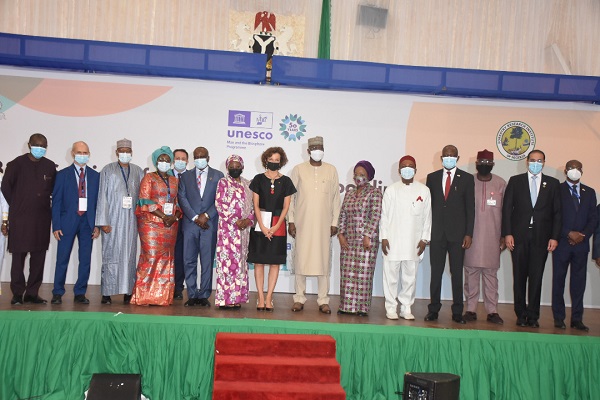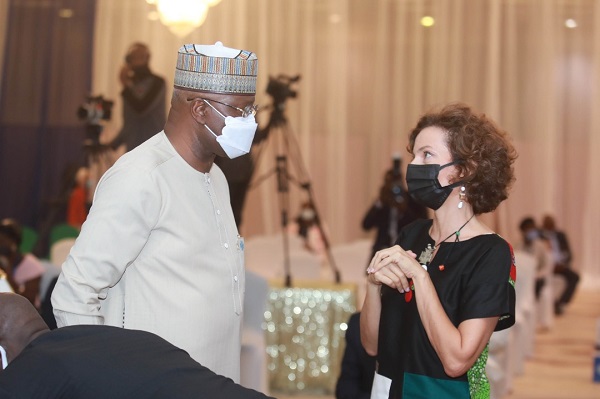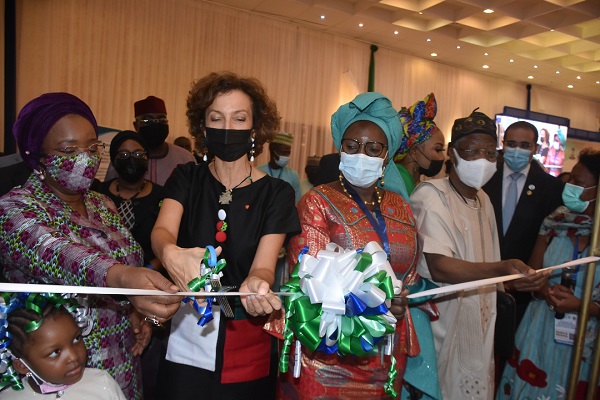
Nigeria’s President Muhammadu Buhari has declared open the 33rd session of the United Nations Educational, Scientific and Cultural Organisation (UNESCO)’s International Coordinating Council of Man and Biosphere (MAB-ICC) programme with a call to world leaders to conserve the earth’s biodiversity.
Speaking at the opening ceremony today at the State House, Aso Villa, Abuja, he tasked world leaders to change their behaviours towards the biosphere by respecting the natural habitat and living in peace and harmony with nature, stressing they are paramount to a future resilient generation where biodiversity is valued, conserved, restored and sustainably used while maintaining ecosystem services and delivering social benefits to the people.
“The importance of the work you all do in your respective countries and for the global community, creating vast reserves, cannot, therefore, be overemphasized. As you work to reconcile humanity and nature, the challenge remains your ability to continually demonstrate that biodiversity conservation can foster human development with a continuous provision of ecological services.
“As you review progress and define priorities, I do hope your experience from the visit of Okwangwo Biosphere Reserve in Cross River State would inform some of the final decisions to be made,” he said.
Represented by the Secretary to the Government of the Federation, Boss Mustapha, Buhari reiterated Nigeria’s commitment to emerging global solutions for addressing climate change and other environmental challenges by informing participants that he pledged at the 74th session of the UN General Assembly that the country will plant 35 million trees nationwide, a pledge he has kept, with about 80 per cent of the trees so far planted.

In her remarks, the UNESCO director-general, Ms. Audrey Azoulay, pointed out that the erosion of biodiversity is no longer a hypothesis, but a fact – one that can already be seen and felt in our everyday lives, stressing the worsening figures year after year reveals the true depth of the crisis the world is currently confronting.
Saying, indeed, climate and biodiversity are inextricably linked, she contended that when one suffers, the other does too – as Nigeria knows all too well, especially on the shores of Lake Chad, adding that with this impending collapse, not only is human survival at risk, but also the beauty, the poetry, the diversity of the world.
Azoulay, however, noted that the collapse is not inevitable, as there is still time to make peace with the planet, saying this is the spirit driving UNESCO’s ‘Man and the Biosphere Programme’ launched in 1971.
“It is what makes it so pioneering and valuable. 50 years on, this vision has become reality, since 275 million people now live in UNESCO’s Biosphere Reserves in 129 countries and, 50 years on, it is this legacy that brings us together at today’s council. It is taking place during a year that we hope will be decisive.
“We have less than 10 years to achieve the goal that the United Nations wishes to set: for 30 per cent of the planet to be covered by protected areas. Therefore, we must double our efforts. This is why, a few days ago, at the Congress of the International Union for Conservation of Nature, we committed to doubling the protected areas under UNESCO’s care by 2030,” she added.
In his goodwill message, the UN resident coordinator in Nigeria, Mr. Edward Kallon, said the COVID-19 pandemic has brought with it devastating consequences, resulting in an unprecedented human crisis that is affecting the world’s most vulnerable and poorest, especially youths, women and children.
According to him, the pandemic has compounded already existing problems like violent extremism, children staying out of school, poverty and food insecurity.
Despite these consequences, he said the COVID-19 pandemic has called the world’s attention to fixing its deteriorating relationship with nature and has reaffirmed that biodiversity is fundamental for human health and critical for sustainable development.
“As we may observe, our combined attitudes and lifestyles have dramatically altered the land around us. We have cleared forests and other natural terrains to create spaces for urban areas, settlements, agriculture and industries.
“In doing so, we have reduced the overall space for wildlife and degraded natural safe spaces between humans and animals. We must all rise and take responsibility to restore this human-nature safe space by taking responsible steps to conserve biodiversity and restore lost resources.
“This brings to mind the current ‘UN Decade on Ecosystem Restoration’ which aims to prevent, halt and reverse the degradation of ecosystems on every continent and in every ocean, in line with the achievement of the Sustainable Development Goals. The Decade, therefore, places a demand on scientists and, indeed, on all of us to work together to recover our lost ecosystems and biodiversity to Build Back Better,” he added.

Earlier in her welcome address, the Minister of State for Environment, Barr. Sharon Ikeazor, said the MAB programme presents a unique platform for cooperation on research and development, ecological restoration, capacity-building and networking to share information, knowledge and experience on three interlinked issues: biodiversity loss, climate change and sustainable development.
Ikeeazor pointed out that the world is facing planetary crises of climate change and biodiversity loss, saying this global loss of biodiversity is threatening the security of the world’s food supplies and the livelihoods of millions of people, including indigenous people and local communities, especially in the African region.
The good news, according to her, is that it is not too late to reverse the current trends if conservation efforts are scaled up and protected areas are expanded, adding that protected areas are the cornerstones of biodiversity and conservation.
While stressing Nigeria’s commitment to taking bold steps to reverse biodiversity loss and to mitigate climate change, she added that Nigeria shall continue to play her role to safeguard the environment for future generations and, with the support of partners like UNESCO, a resilient environment can be sustained as the world strives to live in harmony with nature.


